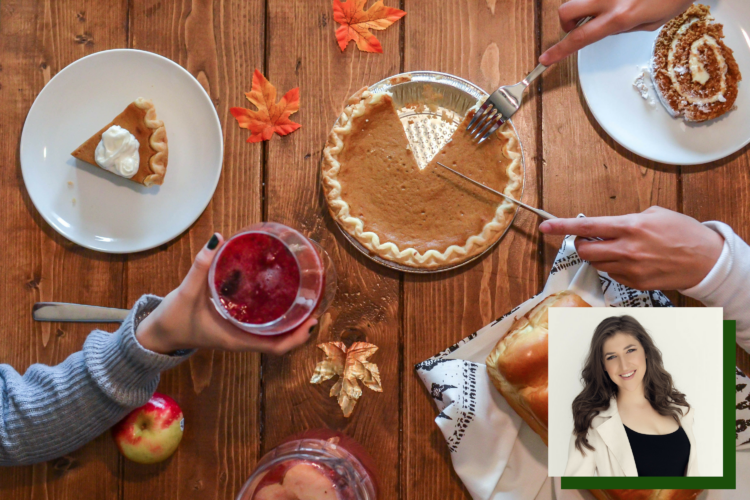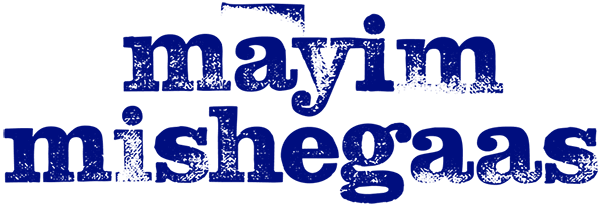
Through Grok Nation, my YouTube channel and my social platforms, I get so many questions about a variety of topics: parenting, breastfeeding, veganism, Judaism, acting and more. That’s why I launched Ask Dr. Mayim, a new advice column on Grok Nation where you can ask me questions about things going on in your life and I’ll give you my best, honest opinion.
I’ve tried to help a struggling newbie vegan and a mother at her wit’s end; here, I give my best advice to a woman looking for kosher knowledge. Read the question and my advice below; at the bottom, you’ll also find out how you can submit your own questions for Dr. Mayim!
Dear Dr. Mayim,
I’ve been invited to my boyfriend’s family’s house for Thanksgiving. They’re Jewish. I’m not. His sister who is hosting keeps kosher. I want to make a nice dessert (Pumpkin Pie Cheesecake, anyone?), but I want to know if that’s kosher? Is there anything special I need to do to make sure what I bring is acceptable? What about wine?
Thanks,
Shiksa Goddess
Tayere (dear) Shiksa Goddess,
What a terrific question. And this is one that I get asked a lot!
Let’s start with a few basics:
1. Not every Jewish person keeps kosher.
2. Not every kosher person keeps kosher the same way.
Kashrut is an elaborate system of laws devised based on the Old Testament’s delineation of what foods are permitted (kosher which means proper) and which are forbidden (treyf is the word for that). These laws are thousands of years old and they are a science unto themselves. They were designed both to separate the Jews from other communities, to safeguard against sickness, a healthy dose of superstition in some cases, and also to uphold the dignity of the welfare of animals in how they are treated, slaughtered and consumed. I find them fascinating and people spend their entire lives studying them.
The basics are: Do not mix meat and dairy. Do not eat shellfish. Do not eat creepy crawly things. Eat only animals with a split hoof that chew their cud (think cows and goats but not camels because their hoof isn’t split all the way to the naked eye.) Use separate dishes, silverware and even tablecloths and dishwashers for dairy and meat dishes. (Yes, this gets expensive!)
Less popular but still equally important rules include things like: Don’t cook fish in meat sauce. Don’t eat any animals of prey. Don’t have dairy at the same table as someone having meat. And do not allow an animal to “bleed out”; slaughter should be done with a blessing of gratitude, a sharp knife and a simple swift slicing of the throat so that the animal does not suffer needlessly. All meat with a kosher certification should be supervised thus. (There have been kosher slaughterhouses found to be in violation of these laws and they typically lose their certification and ought to be severely fined and reprimanded.)
All of this being said, a stringent kosher person who keeps a kosher home typically does not allow people to cook things in a kitchen that’s not kosher and bring them into their home. Why? Cross-contamination. What if you used a pan for bacon and it didn’t get all the way clean and then you baked a pie in it? Yuck! In addition, kosher homes serving turkey for dinner won’t have any dairy products at the same meal. This means the mashed potatoes would have to be made with non-dairy butter or sour cream and the dessert would need to also be dairy-free.
The safest thing to do is to bring something store bought that has a hechsher, or mark of kosher certification. The “safest” certification is the letter “U” in a circle. We call it “OU” and it stands for the most reliable kosher authority in the world, The Orthodox Union. You can also bring fruit, but very religious people don’t even want your (potentially bacon-coated) knife cutting it up. Melons, berries, and grapes are good choices. Jews also like nuts a lot, so a platter of nuts and dates and such is nice.
Make sure if you purchase something store bought that it says “pareve,” which means it’s neither meat nor dairy. It may have eggs, so if you’re watching for allergies or the vegans among you, take note!
If you’re feeling frisky, ask your host her level of observance regarding kashrut. She may say that as long as you make something dairy free, she’s fine to serve it, or she may say, bring wine or sparkling cider. My guess is if you’ve been told she’s kosher, she will opt for the latter.
It’s also possible that she is “kosher style,” which can mean any number of less stringent things that may make all of this answer moot. In that case, tell her to please use the phrase “kosher style” to avoid confusing those of us who do keep kosher homes who tend to be asked to explain what kosher means to shiksa goddesses like yourself!
And just for reference, my Orthodox kosher grandparents who were immigrants to this fine country loved America and all of the opportunity it provided them, but when they once came to our house for Thanksgiving, my grandfather in a heavy Polish accent said, “Why turkey when you can have chicken?”
With that, I will end with wishes for a happy Thanksgiving from my vegan kosher home to you and yours!
M
Want to ask Dr. Mayim for advice? Email askdrmayim@groknation.com, and she may answer it an upcoming column.




 Read More From Mayim
Read More From Mayim
Grok Nation Comment Policy
We welcome thoughtful, grokky comments—keep your negativity and spam to yourself. Please read our Comment Policy before commenting.